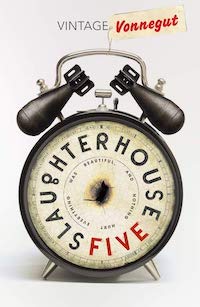
Slaughterhouse-Five was a recommended read when I began researching time travel stories earlier this year. It’s an odd combo which mixes sombre WW2 historical fiction—centred on the horrific British (and American) bombings of Dresden in 1945—and fantasy, involving flying saucers and aliens. Weird, hey?
There isn’t a time machine in sight, though lots of flashbacks and flash-forwards.
I think Vonnegut nailed the perfect name for an alien race. The Tralfamadorians have a comedic ring, but represent a real concept in cosmology. I think Einstein came up with the Block Universe (also known as Eternalism), in which, the cosmos is simply a movie reel, playing a scripted past, present, and future.
The story shifts from the worst of war, to aliens (reminds me of The Life of Brianwhich is a well known comedy) perhaps to lighten the read and cast a philosophical light i.e. it’s all scripted anyway, so were the horrors of WW2 really a choice? Vonnegut fought in the war, so did he hold that view?
The weaving of past, near past, and present builds the main character quite smoothly, though the flitting around and meandering is quite random. There are two, maybe three, stories going together.
Billy, the main character, is a surprisingly pathetic anti-hero for an American soldier who’s supposed to be liberating the war. The characterisation may have been more convincing for a Nazi-incarcerated Jew on the verge of death in a horrific concentration camp.
Overall, I like Vonnegut’s writing, judging by my simple measure of whether I can easily recall what’s on the page by the end of a chapter. There’s a fair amount of narrator voice and some of the world building has a non-fiction feel for historical events and places (something I recognise from Liberty One). Example: “The colonel coughed and coughed, and then he said to Billy, ‘You one of my boys?’ This was a man who had lost an entire regiment, about forty-five hundred men—a lot of them children, actually. Billy didn’t reply. The question made no sense.”
Though a lot of the story is in Dresden, I feel like I saw very little of the city.
The editing indulges itself a bit in places, perhaps signalling the time in which it was written. A character’s taken into WW2 German hands about a quarter through, which may be the first glimpse at what it’s about.
One thing I found quite irritating were frequently repeated, ‘so it goes,’ though I came to overlook them after a while, reminded of why repetition is a writing cardinal sin.
I had to theorise what it was really about as I got towards the end. Some might like that ambiguity and I was fine with it.
Overall Verdict: Very readable if you can get over the odd combination of Dresden vs aliens and Eternalism, and an ambiguous ending. I’m sure I’ll read it again.

There are lots of good quotes. Here are my favourites:
“I am a Tralfamadorian, seeing all time as you might see a stretch of the Rocky Mountains. All time is all time. It does not change. It does not lend itself to warnings or explanations. It simply is. Take it moment by moment, and you will find that we are all, as I’ve said before, bugs in amber.”
“They [British officers] wrestled the Americans toward the shed door affectionately, filling the night with manly blather and brotherly rodomontades. They called them ‘Yank,’ told them ‘Good show,’ promised them that ‘Jerry was on the run,’ and so on.”
“Only the candles and the soap were of German origin. They had a ghostly, opalescent similarity. The British had no way of knowing it, but the candles and the soap were made from the fat of rendered Jews and Gypsies and fairies and communists, and other enemies of the State.”
—————————————————————————
Click here to get Slaughterhouse-Five on Amazon
Other interesting reviews which you may have missed:
Astronaut Wives Club: A great non-fiction book which does exactly what it says in the title.
Rocket Men: Another amazing book which retells mankind’s first foray to the moon on Apollo 8.
The Book of Daniel: A thriller, echoeing the fate of the real Rosenbergs, convicted and executed as American Communists during the fifties Red Scare.
—————————————————————————
Connect with me
What did you think of this or last month’s review?
What other books, movies (or anything) would you recommend?
I’d love to hear from you.
Connect with me by clicking on the socials on the homepage and have your say.


